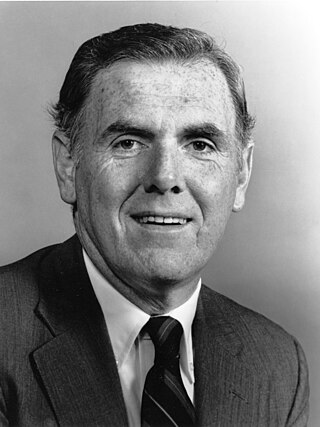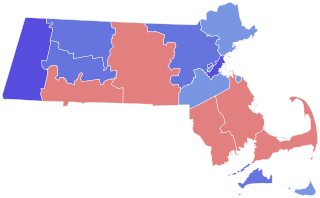
Joseph Paul Trippi is an American political strategist. A member of the Democratic Party, Trippi most notably served as campaign manager of Howard Dean's 2004 presidential bid, and has served as a political commentator for CNN since 2018. He has worked on a number of prominent gubernatorial and United States Senate campaigns, including the successful bids of Jerry Brown for Governor of California and Doug Jones for U.S. Senate in Alabama.

Raymond Leo Flynn is an American politician who served as the mayor of Boston, Massachusetts, from 1984 until 1993. He also served as United States Ambassador to the Holy See from 1993 to 1997.

The 2006 Massachusetts gubernatorial election was held on November 7, 2006. The incumbent Republican governor, Mitt Romney, chose not to seek a second term. Polls had been mixed prior to Romney's announcement, with one poll showing Romney slightly leading Democrat Attorney General Tom Reilly and other polls showing Reilly, who was then the Democratic frontrunner, in the lead.

Thomas Michael Menino was an American politician who served as the mayor of Boston, from 1993 to 2014. He was the city's longest-serving mayor. He was elected mayor in 1993 after first serving three months in the position of "acting mayor" following the resignation of his predecessor Raymond Flynn. Before serving as mayor, Menino was a member of the Boston City Council and had been elected president of the City Council in 1993.

Michael F. Flaherty is a politician who served as an at-large member of the Boston City Council for a cumulative ten terms. A member of the Democratic Party, he was first elected to the council in 1999, serving an initial five terms between 2000 until 2010. During this initial tenure, he served as vice president of the council in 2001 and as council president from 2002 to 2006. In 2009 he forwent reelection to a further term in order to run for mayor of Boston in that year's election, which he lost to incumbent mayor Thomas Menino. He ran unsuccessfully in 2011 to return to the council as an at-large member. In 2013, Flaherty again ran in the at-large city council race, and was returned to the council. He served five terms between 2014 and 2024. In 2023, he declined to seek reelection to an additional term.

The Boston City Council is the legislative branch of government for the city of Boston, Massachusetts, United States. It is made up of 13 members: 9 district representatives and 4 at-large members. Councillors are elected to two-year terms, and there is no limit on the number of terms an individual can serve. Boston uses a strong-mayor form of government in which the city council acts as a check against the power of the executive branch, the mayor. The council is responsible for approving the city budget; monitoring, creating, and abolishing city agencies; making land use decisions; and approving, amending, or rejecting other legislative proposals.

John Ronan Connolly is an American politician, former lawyer, and educator from Massachusetts. He served from 2008 to 2014 as an at-large member of the Boston City Council, and was the runner-up in the 2013 Boston mayoral election.

The 2009 Boston mayoral election occurred on Tuesday, November 3, 2009, between incumbent Mayor of Boston Thomas Menino, and Michael F. Flaherty, member of the Boston City Council and former Council president. Menino was re-elected to a fifth term, the first mayor to do so in Boston history. A nonpartisan municipal preliminary election was held on September 22, 2009, where Flaherty and Menino advanced to the general election.

Maureen E. Feeney is an American politician who served on the Boston City Council and was the City Clerk of Boston, Massachusetts.

The 2005 Boston mayoral election occurred on Tuesday, November 8, 2005, between incumbent mayor Thomas Menino and City Councilor Maura Hennigan. Menino was re-elected to a fourth term.

The Boston mayoral election of 1993 occurred on Tuesday, November 2, 1993, between Acting Mayor Thomas Menino and State Representative James T. Brett. Menino was elected to his first term.

The 2013 Boston mayoral election occurred on Tuesday, November 5, 2013. Incumbent mayor Thomas Menino had declined to run for re-election to a sixth term. A non-partisan preliminary election was held on Tuesday, September 24, 2013. 12 candidates made the ballot to replace Menino, with state representative Marty Walsh and at-large city councilor John R. Connolly advancing to the general election. Walsh was elected to his first term, defeating Connolly by 3% of the vote, and was inaugurated on Monday, January 6, 2014.

Tito Jackson is an American politician who was a member of the Boston City Council. He represented council District 7, representing parts of the Roxbury neighborhood and parts of Dorchester, South End, and Fenway. In 2017, he ran unsuccessfully for mayor of Boston against incumbent mayor Marty Walsh. After leaving the Boston City Council, Jackson worked in the cannabis industry. In 2022, Boston Mayor Michelle Wu appointed Jackson to the city's Commission on Black Men and Boys.

The Boston mayoral election of 1983 was held on Tuesday, November 15, 1983, between City Councillor Raymond Flynn and former State Representative Mel King. Flynn was elected to his first term, and inaugurated on Monday, January 2, 1984.

The 2013 United States Senate special election in Massachusetts was held on June 25, 2013, in order to fill the Massachusetts Class 2 United States Senate seat for the remainder of the term ending January 3, 2015.
Boston City Council elections were held on November 8, 2005. Ten seats were contested in the general election, as the incumbents in districts 5, 7, and 8 were unopposed. Five seats had also been contested in the preliminary election held on September 27, 2005.
Boston City Council elections were held on November 6, 2001. Nine seats were contested in the general election, as the incumbents for districts 1, 5, 8, and 9 ran unopposed. Two seats had also been contested in the preliminary election held on September 25, 2001.

The 2020 United States House of Representatives elections in Massachusetts were held on November 3, 2020, to elect the nine U.S. representatives from the state of Massachusetts, one from each of the state's nine congressional districts. The elections coincided with the 2020 U.S. presidential election, as well as other elections to the House of Representatives, elections to the United States Senate and various state and local elections. Primary elections were held on September 1.

The 2021 Boston City Council election was held on November 2, 2021. All thirteen councillors from the nine districts and four councillors at-large were up for election. Elections in Boston are officially nonpartisan.

Thomas Menino served as mayor of Boston, Massachusetts from 1993 through 2014. He is the longest serving mayor in the city's history. Menino first became acting mayor in July 1993, after Raymond Flynn resigned as mayor to assume the post of United States ambassador to the Holy See. Menino was elected mayor in the subsequent 1993 Boston mayoral election, and was reelected to additional terms in the four subsequent elections, making for an unprecedented and unsurpassed twenty year tenure. On March 28, 2013, Menino announced that he would not seek a sixth term.


















